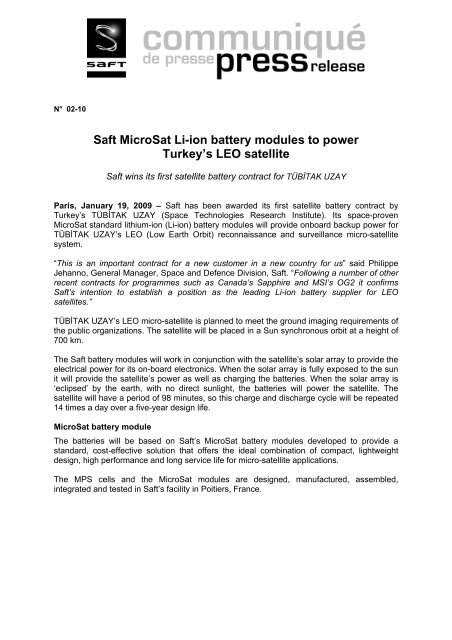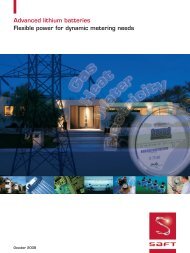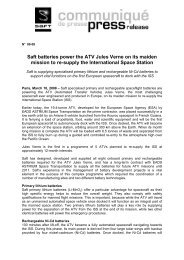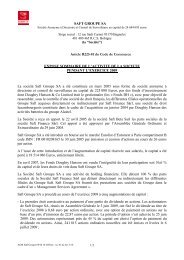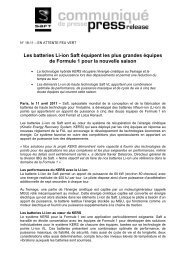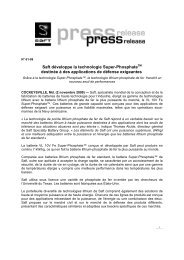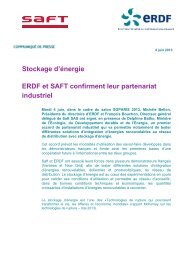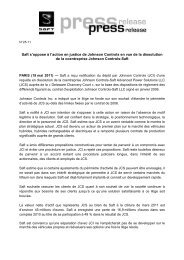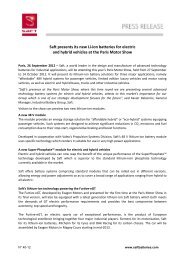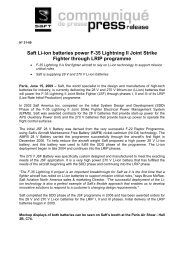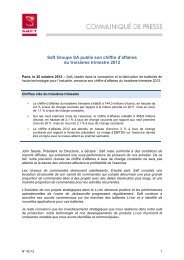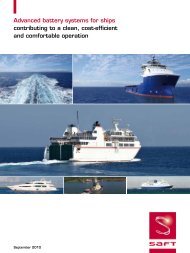Download - Saft
Download - Saft
Download - Saft
You also want an ePaper? Increase the reach of your titles
YUMPU automatically turns print PDFs into web optimized ePapers that Google loves.
N° 02-10<br />
<strong>Saft</strong> MicroSat Li-ion battery modules to power<br />
Turkey’s LEO satellite<br />
<strong>Saft</strong> wins its first satellite battery contract for TÜBİTAK UZAY<br />
Paris, January 19, 2009 – <strong>Saft</strong> has been awarded its first satellite battery contract by<br />
Turkey’s TÜBİTAK UZAY (Space Technologies Research Institute). Its space-proven<br />
MicroSat standard lithium-ion (Li-ion) battery modules will provide onboard backup power for<br />
TÜBİTAK UZAY’s LEO (Low Earth Orbit) reconnaissance and surveillance micro-satellite<br />
system.<br />
“This is an important contract for a new customer in a new country for us” said Philippe<br />
Jehanno, General Manager, Space and Defence Division, <strong>Saft</strong>. “Following a number of other<br />
recent contracts for programmes such as Canada’s Sapphire and MSI’s OG2 it confirms<br />
<strong>Saft</strong>’s intention to establish a position as the leading Li-ion battery supplier for LEO<br />
satellites.”<br />
TÜBİTAK UZAY’s LEO micro-satellite is planned to meet the ground imaging requirements of<br />
the public organizations. The satellite will be placed in a Sun synchronous orbit at a height of<br />
700 km.<br />
The <strong>Saft</strong> battery modules will work in conjunction with the satellite’s solar array to provide the<br />
electrical power for its on-board electronics. When the solar array is fully exposed to the sun<br />
it will provide the satellite’s power as well as charging the batteries. When the solar array is<br />
‘eclipsed’ by the earth, with no direct sunlight, the batteries will power the satellite. The<br />
satellite will have a period of 98 minutes, so this charge and discharge cycle will be repeated<br />
14 times a day over a five-year design life.<br />
MicroSat battery module<br />
The batteries will be based on <strong>Saft</strong>’s MicroSat battery modules developed to provide a<br />
standard, cost-effective solution that offers the ideal combination of compact, lightweight<br />
design, high performance and long service life for micro-satellite applications.<br />
The MPS cells and the MicroSat modules are designed, manufactured, assembled,<br />
integrated and tested in <strong>Saft</strong>’s facility in Poitiers, France.
About <strong>Saft</strong><br />
<strong>Saft</strong> (Euronext: <strong>Saft</strong>) is a world specialist in the design and manufacture of high-tech<br />
batteries for industry. <strong>Saft</strong> batteries are used in high performance applications, such as<br />
industrial infrastructure and processes, transportation, space and defence. <strong>Saft</strong> is the world’s<br />
leading manufacturer of nickel-cadmium batteries for industrial applications and of primary<br />
lithium batteries for a wide range of end markets. The group is also the European leader for<br />
specialised advanced technologies for the defence and space industries. With approximately<br />
4,000 employees worldwide, <strong>Saft</strong> is present in 18 countries. Its 15 manufacturing sites and<br />
extensive sales network enable the group to serve its customers worldwide. <strong>Saft</strong> is listed in<br />
the SBF 120 index on the Paris Stock Market.<br />
For more information, visit <strong>Saft</strong> at www.saftbatteries.com<br />
Press contacts:<br />
Jill Ledger, <strong>Saft</strong> Communications Director<br />
Tel: + 33 1 49 93 17 77; e-mail:jill.ledger@saftbatteries.com<br />
Wayne Pitt, <strong>Saft</strong> Specialty Battery Group, Marketing & Business Development Manager<br />
Tel.: +33 1 49 93 18 65, e-mail: wayne.pitt@saftbatteries.com


